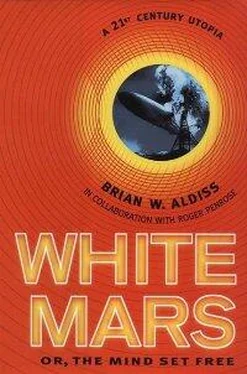Brian Aldiss - White Mars
Здесь есть возможность читать онлайн «Brian Aldiss - White Mars» весь текст электронной книги совершенно бесплатно (целиком полную версию без сокращений). В некоторых случаях можно слушать аудио, скачать через торрент в формате fb2 и присутствует краткое содержание. Год выпуска: 1999, ISBN: 1999, Издательство: Little, Brown UK, Жанр: Фантастика и фэнтези, на английском языке. Описание произведения, (предисловие) а так же отзывы посетителей доступны на портале библиотеки ЛибКат.
- Название:White Mars
- Автор:
- Издательство:Little, Brown UK
- Жанр:
- Год:1999
- ISBN:0-316-85243-0
- Рейтинг книги:5 / 5. Голосов: 1
-
Избранное:Добавить в избранное
- Отзывы:
-
Ваша оценка:
- 100
- 1
- 2
- 3
- 4
- 5
White Mars: краткое содержание, описание и аннотация
Предлагаем к чтению аннотацию, описание, краткое содержание или предисловие (зависит от того, что написал сам автор книги «White Mars»). Если вы не нашли необходимую информацию о книге — напишите в комментариях, мы постараемся отыскать её.
White Mars — читать онлайн бесплатно полную книгу (весь текст) целиком
Ниже представлен текст книги, разбитый по страницам. Система сохранения места последней прочитанной страницы, позволяет с удобством читать онлайн бесплатно книгу «White Mars», без необходимости каждый раз заново искать на чём Вы остановились. Поставьте закладку, и сможете в любой момент перейти на страницу, на которой закончили чтение.
Интервал:
Закладка:
Euclid: “You must have some idea as to the value of this immensely costly research in areas other than particle physics.”
“Smudge research will have an important impact on other areas of physics and astrophysics. After all, it is concerned with the deepest issues of the very building bricks of the universe, the particles of which we are all composed, and their constituent elements.
“A full understanding of mass may lead to matrix-drives that will carry us to the heart of our galaxy.
“It’s concerned, too, with gravitation and with the nature of matrix and time. It relates in a vital way to the understanding of the big bang origin of the universe, and thus to deep philosophical questions. The whole mystery of where the universe comes from and of what the universe is composed—this is what smudge research ultimately involves.”
The same angry voice from the audience now interposed to say, “Self-justification is no justification.”
I saw anger in Thorgeson’s eyes, but he answered in a controlled manner one could not but admire.
“You might ask how any of this really affects society, although the matter remains of great interest to any intelligent person. Well, society might also be deeply affected for a different type of reason. This relates to a third breakthrough, which occurred at about the same time, having to do with the very nature of the human mind—or the soul, as some unscientific people put it.
“In the early years of this century, the development of electronic into quantum computers encouraged the already widely held view that mind was just something that developed when sufficient powerful and effective computations took place. Chess, finally even the oriental game of Go, succumbed to the brutal but speedy computations of these devices.
“Yet no matter how effective these machines were, it was always obvious that they possessed no minds. They couldn’t even be called intelligent in any ordinary sense of that word. Something essential was missing.
“With the development of the quantputer about 2023, distinct new physical features were incorporated, using basic quantum-mechanical principles. We have evidence that the human brain itself operates using these same principles. Thus, it is likely that we have in a quantputer all the essentials of human mentality. As yet, we are still short of knowing all the needed physical parameters.
“In 2039, definitive experiments carried out in France established that there is a CPS, a clear physical signal, emanating from conscious entities alone, and not from non-conscious entities like our present-day quantputers.”
Thorgeson paused to let this sink in before adding, with some emphasis, “We have to improve the quantputer. When we have all the physical parameters—which the smudge should supply—then we shall be able to construct a quantputer that will actually emit a CPS. In other words, it will have consciousness.”
The audience remained unsettled, with voices still calling that Mars was not a laboratory.
John Homer Bateson rose from his seat and spoke, arms folded protectively across his chest. “Professor Thorgeson, I am embarrassed to admit that I lost the thread of your involved argument when you began talking about mind. Whatever mind is. Have you not strayed from your proper subject? And is this not the way of physicists—to usurp ground properly the territory of philosophers?”
“I have not moved from my original topic,” Thorgeson said quietly. But another quiet voice in the audience, that of Crispin Barcunda, said, “At least on Mars we have escaped the powers of the GenEng Institute, busy sculpting Megarich personalities and dupes and living rump steaks. While you guys here stay away from the biological sciences and stick to physics—”
“What’s your question, Crispin?” I asked, insulted by his connecting dupes with living rump steaks.
“Is not the most pressing matter that now confronts us the possible connection between mind and your proposed smudge ring?”
“That’s what we hope to find out,” Thorgeson said.
Other voices started calling. I told them to be silent and allow the lecture to continue.
At this point, Ben Borrow stood up, raising his hand to be seen. “As a philosopher, I must ask what is to be gained by this search for the Omega Smudge? Is it not that which, by your own admission, has brought us to this wretched planet and caused the complete disruption of our lives?”
I answered before Thorgeson could.
“Why should you talk about the disruption of our lives? Why not the extension of our lives? Aren’t we privileged to be here? Can’t we by will power adapt our attitudes to enjoy our unique position?”
He looked startled by my attack, but rallied smartly, saying, “We are of the Earth and belong there. It’s the breast and source of our life and our happiness, Cang Hai.”
“Happiness? Is happiness all you want? What a pathetic thing! Hasn’t the cult of the quest for happiness been a major cause of misery in the Western world for almost two centuries?”
“I didn’t say—”
But I would not let him continue. “The quest for scientific truth—is that not a far nobler thing than mere self-gratification? Please sit down and allow the lecture to continue.”
Thorgeson shot me a grateful look—although he was soon to teach me a horrid lesson in self-gratification. He came boldly to the front of the dais, to stand with hands on hips, confronting his hecklers.
“Look, everything in the universe depends on the fundamental laws that govern particles. All of chemistry, all of biology, all of engineering, every human—and inhuman—action—all of them ultimately depend on the laws of particle physics. Can’t you understand that?”
The audience continued to be noisy. Thorgeson pressed on.
“Most of those laws are already known. The one major thing we do not yet know is where mass comes from. Once we know the Omega Smudge parameters—which will be fixed as soon as we have sufficient HIGMO data, then we will basically know everything —at least in principle. Isn’t that important enough to put a bit of money into, just in itself? It’s philistinism to ask for further justification.”
“Not if you’re stuck here for years,” called someone from the audience, provoking laughter. Thorgeson spoke determinedly over it.
“It happens that some people in the early days of setting up the Mars experiment thought there was another justification for it. These people believed that there has to be more to the human mind than what they refer to as ‘just quantputing’. They reckoned that finding HIGMOs would lead us to a ‘mysterious something’ which would provide a better understanding of human consciousness. Maybe I should use the term ‘soul’ again here.” He gave a brief contemptuous laugh. “There are still some people—even some important people on the project, who shall be nameless—who continue to pursue this sort of notion. A load of nonsense in my opinion.”
He spoke more calmly now, and retired behind his podium to talk rather airily.
“There’s no such thing as ‘soul’. It’s a medieval concept. Our brains are just very elaborate quantputers. Maybe we do still have to tune a few parameters a bit better, but that’s basically all there is to it. Even Euclid would have a mind if he had been constructed with greater sophistication and better tuned parameters. But you can see he has a long way to go—haven’t you, Euclid?”
Euclid: “But I think I have a mind. A different kind of mind, perhaps. Maybe after a few more years, research will detect…”
“The only kind of minds so far we have direct reason to believe in are possessed by humans and animals, since they alone give the clear physical signal which shows up positively in the French experiment.”
Читать дальшеИнтервал:
Закладка:
Похожие книги на «White Mars»
Представляем Вашему вниманию похожие книги на «White Mars» списком для выбора. Мы отобрали схожую по названию и смыслу литературу в надежде предоставить читателям больше вариантов отыскать новые, интересные, ещё непрочитанные произведения.
Обсуждение, отзывы о книге «White Mars» и просто собственные мнения читателей. Оставьте ваши комментарии, напишите, что Вы думаете о произведении, его смысле или главных героях. Укажите что конкретно понравилось, а что нет, и почему Вы так считаете.










